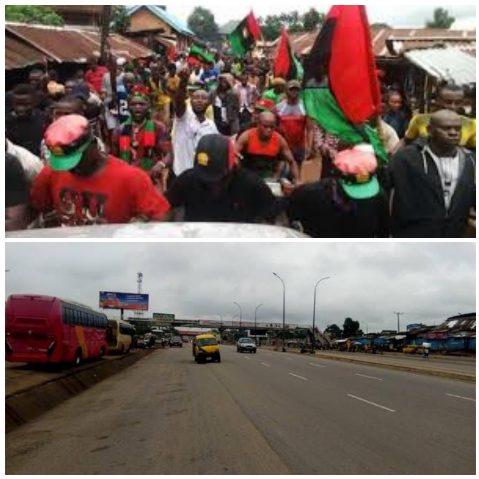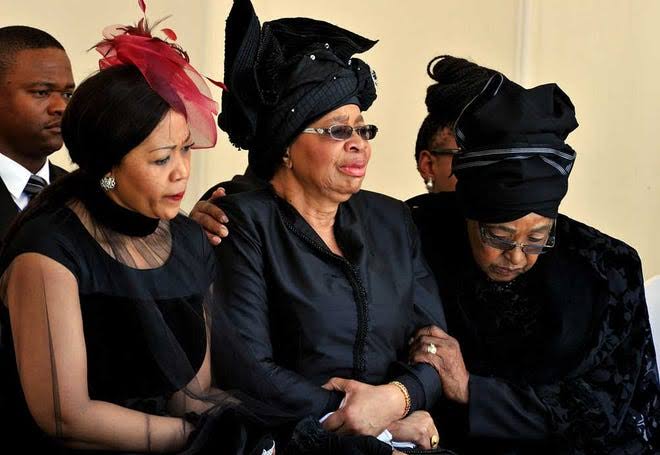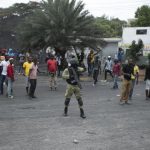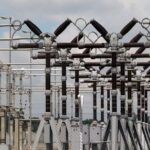THE struggle for self determination by Southeast people currently being spearheaded by Indigenous People of Biafra (IPOB), is indeed supported by many in the region due to some obvious lapses leading to what many conceive as marginalization.
It is considered a legitimate right for citizens in every democratic setting to protest and register their displeasure over issues negatively affecting them in the system, hence, the support of the struggle by a number of groups both of Igbo extraction and outside the region.
Join our WhatsApp ChannelHowever, many stakeholders and observers are worried about the modalities sometimes adopted for the struggle.
Sit-at-home order was first issued by IPOB during Biafran Remembrance day held on May 30, 2021 across Southeast states, which grounded economic activities for two days. The goal was for people in the region to stay at home and commemorate their loved ones who lost their lives during the Civil war of July 1967 to January 1970. This undesirably led to loss of lives and properties in different parts of the region.
Sit-at-home was again deployed on July 30 as a collective voluntary action in the Southeast by members of IPOB in protest over the incarceration of IPOB leader, Mazi Nnamdi Kanu. He has been in Department of State Service (DSS) custody at Abuja after being arrested in Kenya and brought back to Nigeria. The agency has repeatedly failed to bring him to court for trial which is part of the reasons fuelling the agitation.
After the sit-at-home of July 30, it became customary, leading to shutdown of economic activities across the region on every Monday as the order came with a threat that people who violate it by coming out would be maltreated.
This no doubt has gradually turned into what many keen observers describe as self-inflicted injury only suffered by the victim.
The economy of the region is being crippled as people remain at home for fear of being attacked; markets, transport operators, offices and even banks close on Mondays due to the order.
From Monday, it shifted to other days of the week, worsening the economic condition of people who depend on their daily work to feed. Last week, it was observed on Monday and Thursday and people were forced to stay at home.
Since the sit-at-home started, a good number of leaders in Igbo land have at different times through media statements decried the act, citing the negative social and economic consequences of the exercise on the region.
Recently Chairman of South-East Governors Forum and Governor of Ebonyi State, Engr David Umahi claimed that Southeast region loses over N10billion each time sit-at-home order is observed.
On Tuesday this week, Ohaneze Ndigbo worldwide, the apex Igbo socio-cultural organization lamented the continuous grounding of economic activities in the region through sit-at-home order.
He said Igbos have lost more than three trillion naira in all facets of their socio-economic activities due to the exercise.
Former Governor of Enugu state and Chairman, Senate Committee on Cooperation and Integration in Africa, Senator Chimaroke Nnamani noted that the sit-at-home is inflicting serious injury on people in the region.
Senator Nnamani who represents Enugu East Senatorial district, called for end of the exercise adding that it is against the interest of the people who are forced to remain at home.
He also condemned the attack on innocent people who are going about their normal businesses.
Despite the suspension of the sit-at-home as announced by IPOB on August 13, some individuals have continued to cause damage on lives and properties in the name of enforcing the lockdown. Last week, a truck fully loaded with goods worth millions of naira was intercepted by criminally-minded individuals along Ibagwa road, in Nsukka, Enugu state and razed to ashes in the name of enforcing no movement.
On Tuesday morning, some hoodlums suspected to be supporters of IPOB who were commemorating the invasion of Nnamdi Kanu’s home in 2017, reportedly attacked a tricycle operator at Awka. The man was said to have sustained injuries as a result of machete cuts on his body, while his tricycle was burnt. A good number of other road users were reportedly attacked in various parts of Anambra same day, all because they had an order that nobody should come out.
Apart from economic losses, the whole charade has once again created an atmosphere of insecurity in the entire region.
On Monday, students sitting for Junior School Certificate examination in Imo state were attacked for not violating the sit-at-home order.
A statement by the Ohanaeze Secretary-General, Mazi Okechukwu Isiguzoro, described the incident as unfortunate and heartbreaking. He said such wasn’t expected as Igbo people are known educationists, hardworking and entrepreneuring, and not destroyers of properties.
His words, “We are seriously disturbed over these actions that are endangering the future of Igbo pupils students; it is disheartening that the IPOB disciples are playing into the decoys and gimmicks of Igbo detractors.
“It’s nonsensical for any right-thinking Igbo to hinder our youngsters from participating in the WACE examinations under any guise of self-determination. Ndigbo are known to be first-class educationists and entrepreneurs; this new trend is certainly alien to Igboland.”
A Public Affairs analyst, Ambrose Igboke in a chat with Prime Business Africa said that sit-at-home is a legitimate way of protesting against something affecting a group, but is not supposed to be conducted regularly. He said it a social measure that should be adopted on rare occasions.
In his words, “it is legitimate to observe sit-at-home, but what is happening in Southeast is not legitimate because the current sit-at-home is out of concurrence. The opinions of the southeast people were not sort. They were forced to sit at home by the non-state actors out of fear of the unknown, fear of violence, attack, or being manhandled. People stay at home out of fear. That also brings to the fore that our security agencies are overstretched, because if security agencies cannot protect lives of people in an environment where people can move freely, then it shows that we are having issues with securing lives of people.”
On the economic implications of the exercise, Igboke said, “The economic debacle of sit-at-home is tremendous on the people of Southeast. People and government in the region have lost a lot of money. Remember that Monday is the first productive day of the week. You now force people to be at home on Monday when people do a lot of planning for the week, a lot of strategies and other things that will run throughout the week.”
He further stated that the attack on school children who were writing examination, can affect them psychologically.
“The school children who were writing West African examination were made to lose out in some subjects that their counterparts in other parts of the region have written. You are making them lose one year, lose more money, causing them psychological trauma, because they will never forget what happened that day; that IPOB sit-at home made them lose one year, they will never forget it in their life time. So, those behind the act are creating enemies within their own people.
“The Sit-at-home has been abused. It is not an instrument used anyhow. It is supposed to be used sparingly, once in a while so that it can have the desired effect it is suppose to have. Now they have gone beyond even one day. Last week we had two days, this week again we have two days. When you abuse this kind of thing, people start getting wary. You can’t ask people to sit at home every Monday. If you have a legitimate grievance, then you can appeal to your people once in a while to make a statement of fact or make a statement of protest,” Igboke stated.
IPOB has however, issued a statement that the frequent sit-at-home is not there making saying they had suspended it up to three weeks ago, that people who are currently perpetrating violence so far in the name of sit-at-home are not IPOB members.
On Tuesday, 14 September, 2021, another statement circulated on social media allegedly from IPOB that anybody found enforcing sit-at-home will be considered a traitor, who is out there tarnishing their image. Let’s hope that is their true position.
The turn of event in the ongoing sit-at-home may be liked to what happened during the ENSARS protest when a handful of hoodlums high-jacked the protest in some states causing destruction of lives and properties to give impression that the violence, attacks and destructions were orchestrated by the protesters. Similar scenario may be playing out here.
Igboke suggested that since IPOB has come out to declare through a press statement that they have no affinity with those currently enforcing the order and causing problem, there should be collaboration with security agencies to fish out those behind the criminal acts in the region in the name of sit-at-home and bring them to justice so that peace and stability can return to the region to enable people move around freely and carry out their legitimate economic activities.
Victor Ezeja is a passionate journalist with seven years of experience writing on economy, politics and energy. He holds a Master's degree in Mass Communication.


















Follow Us